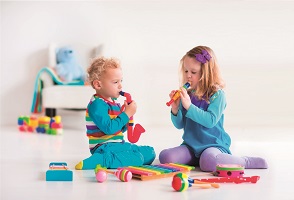Music Is Just The Beginning
 Musical instruments Guest Post by Northampton High School All parents can remember at least one (if not many) times their toddler has proudly made a very loud noise and smiled to their audience, ready for an appreciative reaction While not all impromptu music is always expected, it is wonderful that toddlers are already noticing the way that they can produce sounds and can use these sounds to express themselves. This musical awareness could support a host of skills that can impact a child’s life as they grow, most noticeably when a child is actively involved in the making of music. Whilst your child is loudly banging that drum or singing their favourite song, something very special is also happening in their growing mind and body. Their concentration is being tested, their listening skills are improving, and their mind is learning to recognise patterns. As they join together with friends to produce a band for mum and dad, their social skills are coming into play, they are experimenting with co-ordination and their confidence is growing.
Musical instruments Guest Post by Northampton High School All parents can remember at least one (if not many) times their toddler has proudly made a very loud noise and smiled to their audience, ready for an appreciative reaction While not all impromptu music is always expected, it is wonderful that toddlers are already noticing the way that they can produce sounds and can use these sounds to express themselves. This musical awareness could support a host of skills that can impact a child’s life as they grow, most noticeably when a child is actively involved in the making of music. Whilst your child is loudly banging that drum or singing their favourite song, something very special is also happening in their growing mind and body. Their concentration is being tested, their listening skills are improving, and their mind is learning to recognise patterns. As they join together with friends to produce a band for mum and dad, their social skills are coming into play, they are experimenting with co-ordination and their confidence is growing.
In learning, we can see the benefits of music too. Music and language have been found to have close links and those children who are exposed to music regularly and early in life can often see the advantages in their speaking, reading, listening and hearing skills. Rhythms and patterns in music can be replicated in mathematical learning too. All these benefits will impact children well into their school life and beyond. In a world where exciting colourful toys can sing and dance to your child on demand, and the television can instantly produce musical shows at a touch of a button, it is easy to forget that passive participation is not the same as active participation. A child can join in singing with a TV show but there is no back and forth interaction in this activity. The face-to-face nature of making music together with pots and pans in the kitchen, dancing to the beat and laughing together, offers a child many more benefits. Parents, nurseries and schools may wish to consider giving children lots of varied opportunities to be exposed to music. Shaking that tambourine is not just about making noise, it is about equipping a child with new skills and sparking interest in the world around them. Music at home From 18 months, children can begin to sing. It may not be tuneful - or even recognisable - but exploring their voice is a great starting point in their journey with music. Singing nursery rhymes to your baby and toddler with actions is great fun for everyone. Drumming, tapping and clapping is a fantastic way to explore beats and timing. Learning how to make the sound loud, soft, fast, slow or in patterns gives children an awareness of action and consequence. Movement with the music stimulates brain development and neural connections in the brain, so why not try to incorporate dance too? Creating a dance routine or dancing around the room to a lively tune also gives children a fantastic way to learn about their body - how it moves, and how the movement makes them feel, providing a pathway to create self-awareness.
Written by Northampton High School. Everyone is welcome to visit any of their open events. Please contact admissions on nhs.admssions@nhs.gdst.net to find out more.